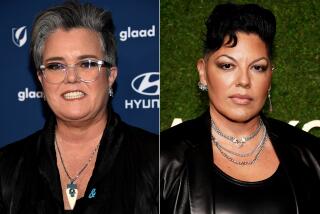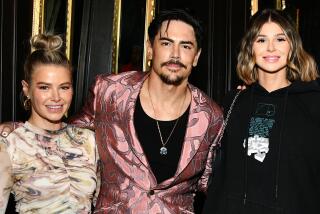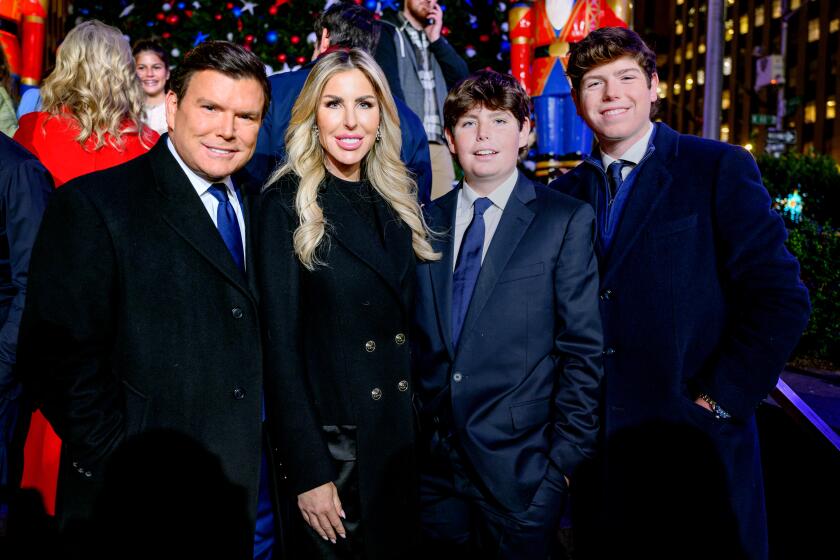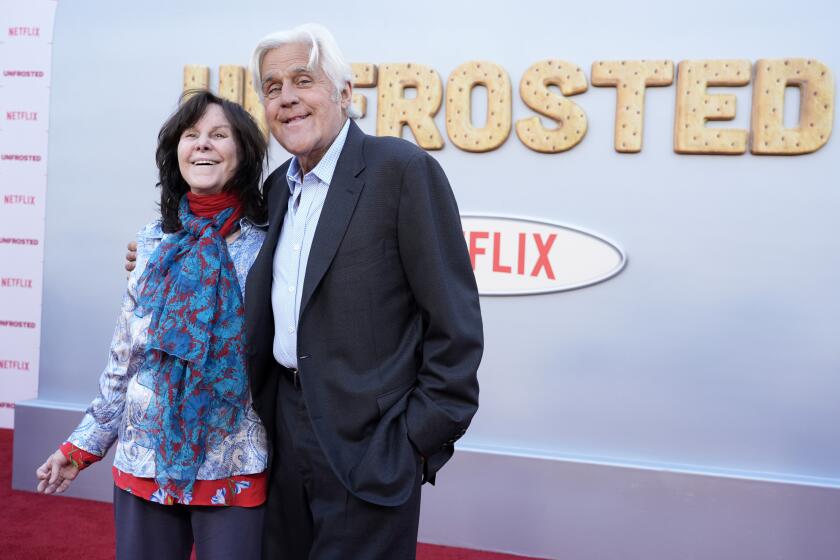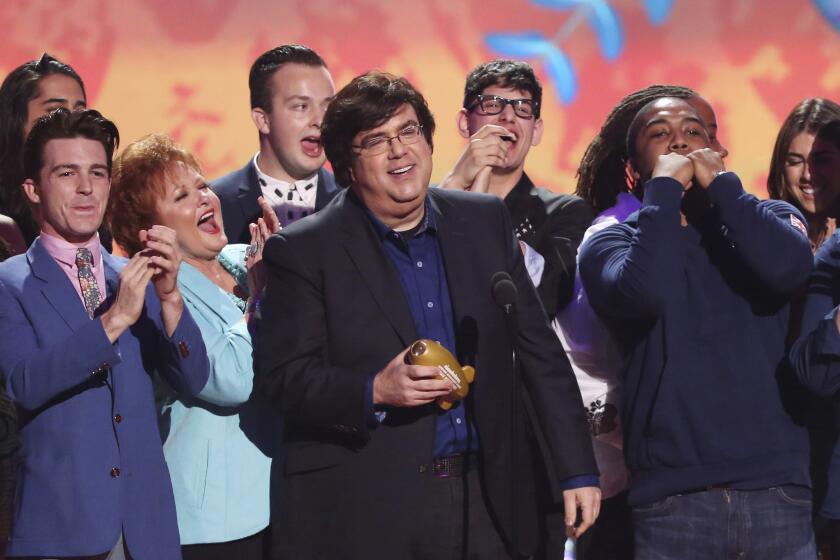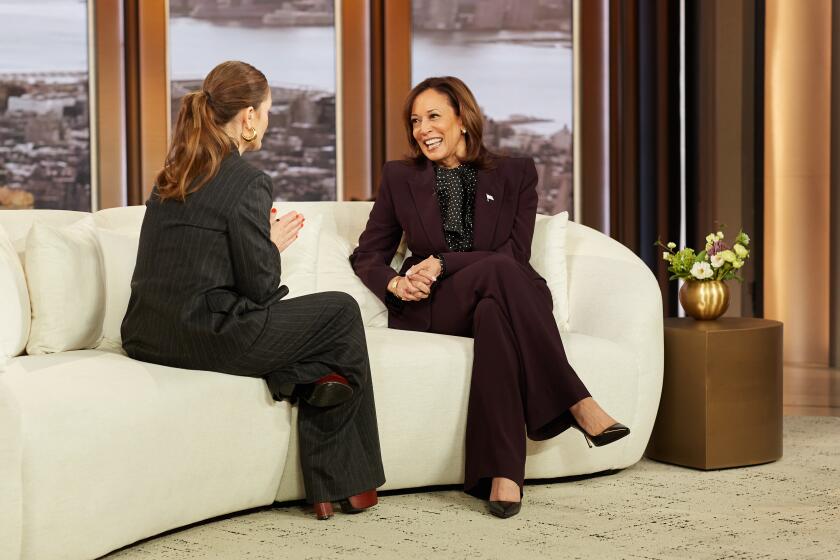Something’s funny about this routine
OK, stop me if you’ve heard this one before: A comedy writer walks into Victors Liquor & Delicatessen in Hollywood at 12:30 Sunday afternoon, says hello to owner Bill Gotti and sits down at a table for 10. Pretty soon, a musician joins him. Then a comedian. Three more comedy writers. Another comedian. Another writer and his 8-year-old daughter. In short order, the old friends start kibitzing about work, reminiscing about their comic heroes and taking jabs at one another along with their eggs.
They’re talking Red Buttons’ death, the future of radio comedian Phil Hendrie and the state of stand-up comedy. They’re remembering old bets they’ve made (Is there really such a thing as white lox?) and roaring at what Slappy White said at Redd Foxx’s funeral (“There’s one thing that would make Redd feel better now, and that would be if I went into Redd’s show and replaced him”). And they’re trying out jokes.
“I have a surprise TV appearance next week on NBC,” announces Mike Rowe, an Emmy-nominated writer for “Futurama” whose credits also include “The Family Guy.” “It’s a little show called ‘To Catch a Predator.’ ”
For the next two hours, it’s a stream-of-comedy free-for-all where the only rules are be quick and funny.
There’d be nothing unusual about this get-together -- comics fill up tables at restaurants all over Los Angeles -- except this brunch has been a Sunday tradition at Victors since 1991. For 15 years, the same core group has seen one another through marriages and divorces, births and deaths, successes and failures.
“This thing has gone on long enough to go from [women] and dope to prescriptions and colonoscopies,” says Eddie Gorodetsky, an Emmy winner for “Late Night With David Letterman,” producer of “Two and a Half Men” and producer of Bob Dylan’s XM Satellite Radio show.
It was here that Phil Rosenthal found out that his show “Everybody Loves Raymond” had been picked up as a series. Les Moonves, the head of CBS, called Victors. Rosenthal picked up and said, “Whaddya want? I’m eating.” Moonves said -- “very quickly, and to his credit, this was a great line,” Rosenthal remembers -- “Order an ice cream sundae.”
“That’s a memorable moment,” Rosenthal says, “and it was at Victors, and it’s indelible now. It has a special place in my heart because that happened there and I was with my very good friends, so it meant a lot.”
On any given Sunday, the group is eight to 10 strong. But there’ve been as many as 35 gathered around the table and, on equally rare occasions, a much smaller number.
“There was a very recent one where I was the only one who showed up,” says comedian Jeffrey Ross, whose recent documentary film, “Patriot Act,” has gotten wide praise.
“No, you probably showed up at 3 o’clock and we were gone then,” shoots back Alan Kirschenbaum, a writer on the sitcom “Yes, Dear” and son of Borscht Belt comic Freddie Roman.
“A lot of guys come for the camaraderie,” Rowe says.
“I come for the material,” Ross says. “It’s good for roasts. I always leave with more.” Later, Ross will crack, “I just come because the bathrooms here are cleaner than at my house.”
The regulars are mostly former New Yorkers who made their way to Hollywood in the late 1980s. Kirschenbaum and Rosenthal have been friends since high school; Rosenthal slept on Kirschenbaum’s couch his first month in L.A. Rowe’s first paid writing job came when Gorodetsky, then a supervisor for the Comedy Channel (now Comedy Central), hired him. When Rowe moved to California -- around the same time Gorodetsky did -- he worked with Kirschenbaum and Rosenthal on the sitcom “Baby Talk.” “I’m sure you remember ‘Baby Talk,’ ” Rowe says.
“We have a clip, actually,” chimes in another regular, Don McEnery, co-writer of Disney’s “A Bug’s Life” and “Hercules.”
They invited Gorodetsky to come talk shop.
All four lived nearby, and Victors, which opened in 1991, was one of the few restaurants around. Location was everything, especially for Gorodetsky, who only learned to drive 10 years ago.
Soon, the table expanded. Kirschenbaum brought along L.A. music scenester Chuck E. Weiss -- the subject of Rickie Lee Jones’ “Chuck E.’s in Love.” Ross came along, as did Lee Frank (a comedian who’s written for cable TV’s “Reality Remix” and “Girls Behaving Badly”) and McEnery, who used to headline the Wall Street comedy spot called Jokers and Brokers, where Ross got his start. McEnery persuaded his poker buddy Jonathan Solomon (comedian and writer for “Mad About You” and also a friend of Rowe’s and Frank’s) to come break bread.
“In L.A.,” Rosenthal says, “our social culture is in our restaurants because we all drive everywhere. In New York, you can walk down the street and run into somebody and have a conversation. But in L.A., you have to meet at an appointed time and an appointed place, usually a restaurant for lunch or for dinner. And that’s where you socialize.”
On this Sunday, like most other Sundays, socializing inevitably leads to reminiscing.
“Here’s how much I wanted to do stand-up,” Rowe says. “I came from Connecticut, 19 years old, $500, living with some gay, 75-year-old fat man that I didn’t know.”
“At first,” Kirschenbaum appends, breaking up everyone at the table except his daughter, Molly, who’s reading a book and ignoring the laughter.
Frank: “I remember doing Noah’s Ark for $60 on a Tuesday with Ray Romano.”
Kirschenbaum: “That was good, $60.”
McEnery: “Are you sure it was $60? That sounds like a lot of money for back in those days. Usually, it was $30, $50. Sixty dollars, you said?”
Kirschenbaum: “Are you going to fight the guy over it, Don?”
Rowe: “What were the credits, Lee, that you got that?”
Frank: “I drove a Ford Festiva.”
The line kills.
All the regulars showed up this particular week, except Rosenthal, who was out of town. (He was interviewed later, by phone.) Come to brunch another Sunday and you might find comics Sarah Silverman and Andy Kindler, “The Simpsons” and “Futurama” writer Bill Odenkirk and “Six Feet Under” writer Scott Buck at the table. Legendary session drummer Rick Marotta used to come, but “he couldn’t take us,” Rowe says. “His dad was sick and we did 20 minutes on his ailing dad.”
“I don’t think he stopped because of that,” Rosenthal says. “I think he stopped coming because his food never came.”
*
Uh, it’s not about the food
ROSENTHAL loves to joke about the food and the service, neither of which, truth be told, is all that extraordinary. But what’s going on here is. As Rosenthal says, it’s kind of an ad hoc support group where they get together to share their show business war stories. Nothing’s ever so serious that they stop laughing, and everything’s worthy of a joke. About the only time these guys ever get remotely serious is when they’re talking about comedy. A question about sitcoms riles them, and then brunch becomes a crash course on the state of television comedy.
Gorodetsky starts, saying the pendulum will swing back to sitcoms eventually. “There are only so many maggots you can see crawling out of a perp’s buttocks.”
Rowe argues that audiences need to participate in comedy, and with the shows being done now, “You don’t get invested in the characters.... There’s nothing to relate to. It’s like watching long sketches.”
Kirschenbaum: “If something like ‘Desperate Housewives’ is working on a comic level, that’s fine too. I’ve seen a few. They go for laughs here and there. We quantify stuff and categorize stuff. The audience, if they like these people, they’re going to watch that. They can have a laugh and have a dramatic moment all in the same thing.”
Gorodetsky: “It’s like if you’re a guy who makes insulin, you don’t care if a person takes it by a subcutaneous injection or in pill form.”
Kirschenbaum: “That’s exactly what I was saying.”
Solomon: “I’m doing a family sitcom where everyone has diabetes.”
Kirschenbaum: “If there’s one thing I’ve been exposed to a little bit over the last little bit of time, it’s ...”
Rowe: “Radiation.”
Kirschenbaum: “... that development executives seem to want high-concept stuff. Where the long tradition of television comedy is lower-concept stuff. It’s a place where these funny people sit and talk.”
Gorodetsky: “Look at ‘Two and a Half Men.’ It’s two brothers living together. One’s divorced, one isn’t. One has a kid. Not exactly, ‘He’s crossing off everyone he did wrong to.’ Basically, it’s people sitting around the couch.”
Kirschenbaum: “Used to be, movies were more of a medium about the idea. TV was more a medium about the execution and the long, slow build.... To get a project coming and down the development pipeline and onto the air seems to be very much an idea-based thing now. And I don’t know that the results are borne out in the success of that.”
McEnery: “A lot of it is when you say ‘six people sitting around talking,’ they go, ‘What, “Friends”?’ They’ve got so much to compare it to.”
There’s more they could say. Much more. But it’s getting to be 2:30. Weiss says goodbye first, and pretty soon everyone settles the check and heads for the parking lot. A few handshakes later, they all scatter.
Till next Sunday.
More to Read
The biggest entertainment stories
Get our big stories about Hollywood, film, television, music, arts, culture and more right in your inbox as soon as they publish.
You may occasionally receive promotional content from the Los Angeles Times.
